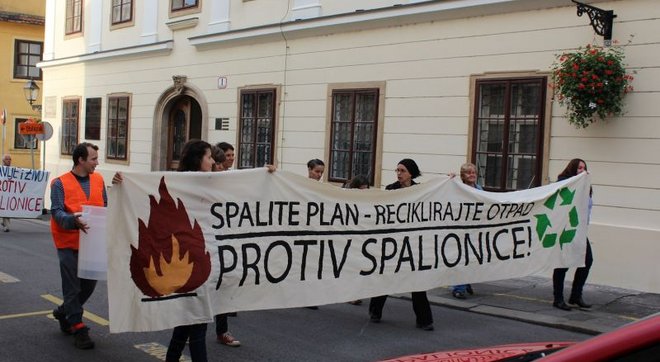We demand the rejection of the proposed Zagreb Waste Management Plan and call for a new plan based on waste prevention and recycling, with no incineration.
- Organisation
- Activities
- Knowledge

We demand the rejection of the proposed Zagreb Waste Management Plan and call for a new plan based on waste prevention and recycling, with no incineration.
Activists from Zelena akcija and UZOR from Resnik held a protest in front of the Zagreb City Assembly on Thursday, 25th September, where a meeting of the City Assembly had been due to take place. The approval of the Waste Management Plan was put on the agenda, but at the last minute the meeting was postponed.
The draft Plan includes a waste incinerator in Resnik on the outskirts of Zagreb, ignoring numerous submissions during the recent public consultations from experts, NGOs and the public which emphasised the negative impacts that the Plan would have on the environment and Zagreb residents. As well as the Waste Management Plan, changes to the City of Zagreb spatial plan were due to be approved at today's meeting, as a precondition for the adoption of the waste plan.
The draft Plan put forward for voting at the Assembly sees an incinerator as the only option for resolving the waste management question in Zagreb, and neither gives any alternatives, nor examines any other measures from the legally-enshrined waste hierarchy – prevention, re-use, door-to-door collection of separated waste and maximum recycling. With a combination of such measures, combined with alternative treatment of the sludge waste from the wastewater treatment plant, the amount of residual waste can be reduced by up to 95%. If the incinerator was to be built, 100 000 tonnes per year of ash would be left to landfill, with around 10 000 tonnes of hazardous fly ash and filter residues which would have to be exported, at great expense. In addition, a system which excludes incineration is significantly cheaper and can be easily co-financed by EU funds, which is not the case with an incinerator. Priority methods of waste management such as separate collection and recycling are much more likely to get EU funding.
With Zagreb's system of recycling points and recycling yards, only 1.6% of waste is collected separately. Adding separated commercial waste brings the total to 25%, which means that the legally stipulated target of at least 50% by 2020 is impossible to fulfil with the existing infrastructure. Residents must be enabled to separate waste at home, which would increase separate collection, enable greater control of the waste streams and allow people to influence their monthly bills. In other words, those who separate waste would have less mixed waste and therefore lower bills. Such a system can be introduced in a very short time period, but requires political will.
Apart from the fact that building an incinerator would hinder the introduction of a quality recycling system and therefore prevent the achievement of targets laid out in both Croatian legislation and EU Directives, a number of other arguments show the damage caused by incineration. As well as the cost of the incinerator itself, opportunity costs must be added, as the incinerator would prevent the recovery of raw materials that could be sold for additional income and would create additional jobs. In addition, numerous measurements show that incinerators emit excessive amounts of hazardous substances such as dioxins and furans, with negative impacts on people's health and the environment, as well as greenhouse gases. It is also worth mentioning that the energy efficiency level of incinerators is relatively low and the share of electrical energy or heat obtained and used for households is very small. Finally, if an environmentally acceptable waste management system is put in place and EU and national targets are met, an incinerator is unnecessary.
We demand the implementation of a waste management system based on the waste hierarchy. Therefore, before the next City Assembly meeting at which the plan is considered, the Plan needs to be changed to exclude any kind of incineration, and needs to lay out a waste management system based on intensive progress on separate collection of waste and on recycling. This would enable the creation of a sustainable waste management system that would protect people's health and the environment, and save enormous amounts of money and limited resources.
You may upload our content in an integral or revised version with the indication of the organisation Zelena akcija/FoE Croatia - under the terms of the Creative Commons Attribution 4.0 International License.
This permission does not apply to stock photos and embedded content of other creators.
Design & development: Slobodna domena Zadruga za otvoreni kod i dizajn